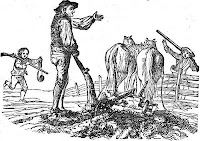Liberals don’t want to hear that meritocracy is creating a semi-permanent underclass. Even more, they reject attempts to connect moral decline to their leadership. (We’ve covered Murray’s book here, here, here, here, here, and elsewhere.)
That’s why last Sunday’s front page New York Times story is so important. In a long article, reporter Jason Deparle confronted the very issues Murray raised in his book. Deparle wrote:
41% of births in the United States occur outside marriage, up sharply from 17% three decades ago. But equally sharp are the educational divides. . . Less than 10% of the births to college-educated women occur outside marriage, while for women with high school degrees or less the figure is nearly 60%. Long concentrated among minorities, motherhood outside marriage now varies by class about as much as it does by race.
“The people with more education tend to have stable family structures with committed, involved fathers,” said [Sarah McLanahan, a Princeton sociologist]. “The people with less education are more likely to have complex, unstable situations involving men who come and go.” . . marriage also shapes the story in complex ways.These are Murray’s findings exactly. Deperle connected economic problems and marital decline because poorer women see fewer “marriageable men,” so end up struggling alone. He quotes Harvard sociologist Christopher Janks: “The people who need to stick together for economic reasons don’t, and the [wealthy] people who least need to stick together do.” In fact Robert Lerman of the Urban Institute ties 40% of inequality’s growing gap between lower-middle- and upper-middle-income to single parenthood.
Another study of 2,000 mothers in their mid- to late 20s found that a third with high school degrees or less already had children with multiple men, along with 12% of mothers with post-high-school training. But none of the women who finished college before giving birth had had children with more than one man.
Brookings Institution’s Scott Winship looked at class movement by 2,400 Americans now in their mid-20s. Of those in the poorest third as teenagers, 58% with two parents moved to a higher level as adults, while only 44% of those with an absent parent did. At the top, just 15% of teenagers living with two parents fell to the bottom third, but 27% of teenagers with one parent dropped to the bottom.
Deparle’s findings about the sharply rising and negative consequences of single motherhood are so similar to Murray’s that the liberal New York Timesman was forced to acknowledge the existence of Murray’s book. But Deparle did so only in a sentence bordered by parentheses, in which he said that Murray “attributed the decline of marriage to the erosion of values, rather than the decline of economic opportunity.”
That drew a sharp rebuke from Thomas Sowell of Stanford’s Hoover Institution:
[Deparle’s] outcome differences are called "class" differences. . . when two white women, who came from families in very similar social and economic circumstances, made different decisions and got different results . . . Personal responsibility, whether for achievement or failure, is a threat to the whole vision of the left, and a threat the left goes all-out to combat, using rhetoric uninhibited by reality. [emphasis added]The meritocracy may read Murray, but seemingly still cannot grasp how government programs eat away at personal responsibility rather than nurture it. It's a fact that the 48 years since liberals launched the war on poverty are the very 48 years single motherhood has exploded. It’s time for the meritocracy, hardworking and to be found nurturing children in two-parent families, to advocate on behalf of personal responsibility at all economic levels. As Murray says, it's time for the upper class to preach “what it practices.”
If not, then the current elite should allow power to pass from their hands. They should allow others to try personal responsibility based on competition and freedom of choice.











